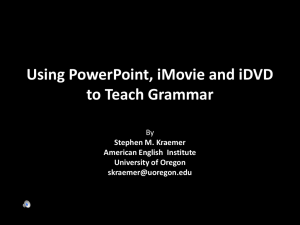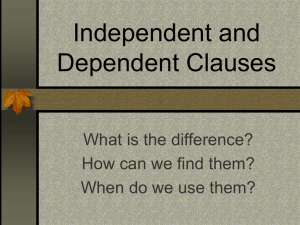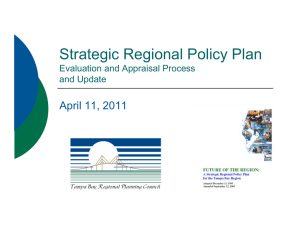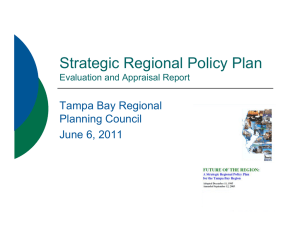Socially responsible public procurement & public-social partnership -
advertisement
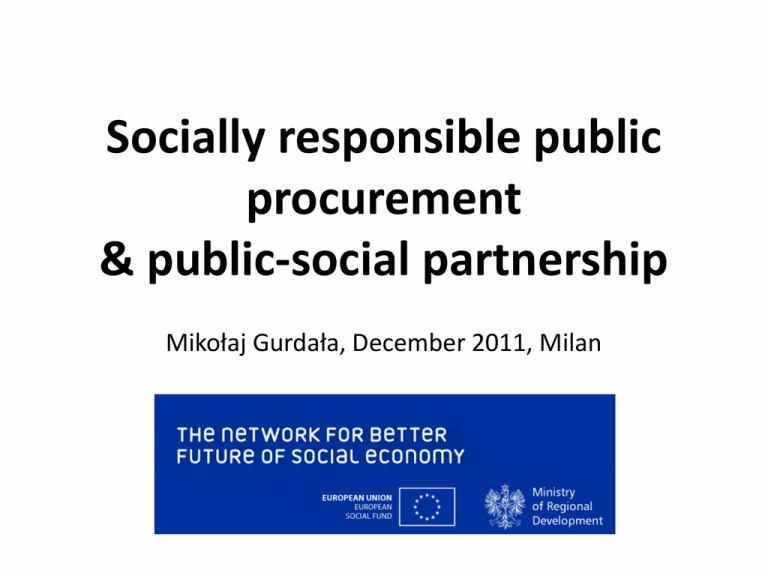
Socially responsible public procurement & public-social partnership Mikołaj Gurdała, December 2011, Milan Structure of presentation • • • • Part 1a: Basic information about the strand: it's background, methodology and outputs from surveys and desk research; Part 1b: SWOT analysis as practical background to the final recommendations; Part 1c: recommendations of the strand as main product and output. Part 2: recommendations & mainstreaming + connection with the other strands Part 1a Thematic strand of SRPP and PSP The aim of the strand to examine the practice of using public-social partnership in different EU member states and its impact on social economy development. to check how social clauses are used by member states, how member states include social enterprises into public procurement process to gather some good practices in both fields, that could be disseminated among EU institutions, EU member states, policy making agencies, ESF MA’s and social economy organizations Methodology main definitions: public-social partnership, social clauses, strategic approach in public procurement tools: questionnaires and desk research, SWOT analysis outputs and results: good practices, practical tools Analysis and Products September 2010 - preparation of a questionnaire October/December 2010 – collecting and analysing questionnaires December 2010/February 2011 – comparative analysis => final report (report for internal use = pre-product) March 2011 – presentation and discussion at BFSE Warsaw seminar April/August 2011 - following analysis (In the meantime, response to the European Commission`s consultation on the modernisation of EU public procurement policy = product) September 2011 - peer-review meeting (SWOT analysis of good practices = product) October/December 2011 – (recommendations = product) Outputs 1 difficult documentation to measure and compare close connection between PSP and social clauses PSP vs. PPP (Anglo saxon and continental approaches, Italian experience) Where does “the third sector” end? In other words: accepted social economy definition may lead to different approaches, e.g. Scandinavian “social enterprise status” or wide perspective of UK’s attitude towards social and economic mixture of ngo’s. Outputs 2 Why do we need to cooperate? - difficulties on both sides of public procurement: public buyers and bidders good practices - tools, programmes, trainings, promotion, etc. strategic approach (holistic approach to public procurement including its three main phases: pre-tender, tender proceedings, award and execution of the contract continuation of analysis on practices: “actions plans” (Belgium), “piani di zona” (Italy) and “Eight rules of good commissioning” (UK) Background for recommendations & general trends • • • • • Directive 2004/17/EC & Directive 2004/18/EC Europe 2020 Strategy “GREEN PAPER on the modernisation of EU public procurement policy. Towards a more efficient European Procurement Market” (2011) including social actors` views (PASE report 2011) “Buying Social” Guide (2010) Social Business Initiative (2011) Background for recommendations & general trends • • • • • To a certain extent: less focus on administrative issues and more on practice of social clauses implementation need to improve officers` knowledge about social economy and social innovation given by SRPP (social added value, lower costs for community in the long term) encouraging public authorities and social stakeholders to cooperate in a partnership formula need to increase public awareness about the value of “social buying”, giving reliable evidence on social impact need to watch carefully how local communites could be more resist to economic crisis by involving social economy in solving social problems and exclusion (sustainable approach) Background for recommendations - strand perspective • • former strand analysis and good practices from partner countries - identification of products/outputs useful for the strand, BFSE network and its target groups discussions and contributions during project events (seminar/ peer review) gave other perspective to the strand findings - e.g. presenations by Polish officers and social economy enterprises on how hard is to implement SRPP and PSP in reality Part 1b SWOT analysis (product) SWOT Analysis to examine the strenghts and weeknesses of good practices in the field of PSP and SRPP to check how social clauses are used by member states, how they include social enterprises to bring analysis about possible negative and positive trends in SRPP, especially social clauses to open the discussion, how PSP and SRPP should be implemented into EU- and national levels Strenghts - “piani di zona” • • • • Broad consultation process always results in partnerships making profitable and effective decisions; „Piani di zona“ is not only a tool for particular area covering certain community, but it enables groups of communities to co-operate for better analysis of local problems and find more effective solutions; „Piani di zona“ have a strong reference to the third sector organizations (in this case social cooperatives may play an active role). But also citizens` organization have a lot to say in the whole process; „Piani di zona“ may use various approaches in order to reach forseen goals. This contains also organization of tenders with social clauses dedicated for social cooperatives. Strenghts - “action plans” • • • • • Each „action plan“ is strongly connected with national polices which makes it more general and sustainable tool; „Action plans“ refer to putting social considerations into public procurement, which enables the easier implementation of social clauses in Belgium; In economical terms, „action plans“ are covering mainly all sectors, which makes them strong and effective policy-making tool; "Action plans"are drafted both at the federal and regional level and even a federal one has a strong input from regional experience, mainly by Flemish authorities "Action plans" refer to sustainable procurement in general, including e.g. "green clauses" and fair trade labelling for foods and products, which makes them more complex and universal tools adaptable for implementing socioeconomic values of modern societies. (EC guidelines from „Buying social guide”) Weaknesses “piani di zona”, “action plans” • • • • „Piani di zona“ is a locally-oriented initiative, which may lead to losing some more general development aspects and looking very narrowly at the particular community aspects; „Action plans“ are not so detailed. They are mainly dedicated to whole sector not a single social-economic problem like „piani di zona“; Social economy entities are involved in both practices but they are not main actors or receivers of the actions; Both „piani di zona“ and „action plans“ are dedicated to either certain sectors or socio- economic problems and communities set at a particular time framework. Other good practices • • Eight principles of commissioning services at tender (UK): use of expertise of social economy organizations; need for assessment, evaluation, performance planning and review of the service; mapping of potential suppliers of resources including their operational ability; to ensure transparent and fair process concluding contracts with the appropriate level of risk. Criteria for sustainable public procurement (Belgium) must comply with generally applicable national law and Community law, and in particular: • • • non-discrimination: the share of bidders from other countries, states can not be blocked or hindered by national regulations principle of equality: all bidders have the right to an impartial assessment and equal opportunities to make an offer based on the principle of competition. transparency rule: the action of a public body must be logical,reasonable and transparent. Opportunities for PSP and SRPP • • • • There are a few models for measuring value of using social clauses (also social added value) available or under construction and sets of guidelines for public procurers – e.g. "Eight principles of commissioning services at tender" There are symptoms of treating a tender as a process, where all steps and impacts are being taken into account (UK, Sweden, Flanders, Italy); Preparing a toolkit for administration at national level illustrating in practice how to implement social clauses into different tenders - such a toolkit must include an example of applying social clauses via complete tender documentation accepted by national or regional public procurement office and control bodies in order to make public procures and bidders feel secure with their usage. SRPP may work not only at local level, where cooperation between social economy and public bodies escapes some barriers and stereotypes. Threats for PSP and SRPP • • • • • Lack of knowledge on the part of public procurers, decision makers and social economy entities about possibility for using PSP&SRPP; Lack of innovation Social clauses are treated as a tools themselves without seeing a wider perspective for the devlopment of social economy and still existing legislative barriers for officers, especially at the regional and local level; Public bodies will not be interested in application of social clauses, when procedures are difficult and risky for them, especially in times of economic crisis while cutting down the administrative costs; Legislative initiatives tending to add another duties to public procurers without any reasonable analysis of the real impact of using social clauses Part 1c recommendations (main product) Recommendations – target groups • • • • • EU level - DG Market, DG Employment, DG Regio, DG Enterprise; Eurpean Parlament, Committee of Regions, EU-social economy organizations National level - ministries, ESF MA’s Regional level - governments, ESF MA’s Policy makers - agencies, institutions Local level - communities, social enterprises, private business Recommendations 1 • • • • • • public procurement as socially responsible tool may by used to achieve also other goals then only social inclusion - regional and local level social clauses cannot be seen as separated tool to solve problems; only strategic approach towards public procurement makes it really effective - all levels social clauses must be clarified by providing examples (toolkits, guides) - EU and national level, policy makers social accounting should be taken into considearions as baseline for procurement processes, apart from life-cycle costs - national, regional and local level, policy makers, EU - to consider social innovation as tool to incubate and exchange good practices - national and Regional level there is still unused capacity for PSP - it should be obligatory for the ESF project’s (e.g. EQUAL) - national, regional level Recommendations 2 • • • • social clauses usage has to be measured not only at quantative level, but also in qualitative way in order to collect good examples - national, regional and local level, policy makers, EU - to consider if contracting for social economy enterpries raises fast below EU thresehold, what not to make reservations or “joined-in” contracts for those entities - over 193.000 euro for national level ; over 125.000 euro for regional and local level education, education, education - there is no progres in this field without well educated and proffesional officers - regional and local level + policy makers including controlling agencies let the social enterprises become, who they are; strong competition with private business may press them to forget about social inspiration of their activity, pursuing them to be more “business-thinking” then this is needed - policy makers, local level Recommendations 3 • • • • creation and development of databases gathering information about the social clauses usage and its impact - national, regional and local level, policy makers, EU - to consider simplify the law or deregulate it in the field of social clauses, if possible EU and national level link education and promotion with “success stories” and practical tools; less theoretic seminars for officers, more bringing “real life” into perspective of public procurement - national and regional level, policy makers SRPP sould be treated as an innovation for which the officers receive a reward not a penalty for implementing the law, which is not clear and in common use - regional and local level + policy makers including controlling agencies Recommendations - links with other strands • • • • there is no SRPP when social enterprises are weak market players proffesional & financial support - link with financial instruments & social added value some social enterprises are not able to be competitive - let’s enable them to be involved in SSGI or conract them in easier way by lowering the administration issues in providing contracts social enterprieses have to play specific role - we need measure the whole impact of its activity - link with social added value social economy is something more then social enterprise - we have see the EU member states differences in approach towards different types of social economy (cooperatives, firm, assocations, ngo, etc.) and this business may be runned – link with social franchising Part 2 mainstreaming Mainstreaming • • • the main objective is to show the strategic perspective of public procurement AWARNESS AND KNOWLEDGE to encourage public institutions and social economy to cooperate not only in contracts, but mainly by partnerships - PROCESSES the ideas, practical tools and guides may be presented at different levels - PRODUCTS Mainstreaming 2 • • • consultation process should be always the initial part of preparation of any action involving partners - “bottom-up” meetings, focus groups at local and regional level; also proffesional expert panels for policy makers and EU-institutions spreading the idea of SRPP by open access to databases including information about calls, tenders and contracts: if others did, we can also use social clauses - presenations and mainstreaming via Internet (Facebook, Twitter) when preseting the social clauses, we need to involve people’s awarness in social buying and corporate social responsibilty - media relations, TV, radio and Internet campaigns, local and regional events (e.g. social economy exhibitions connected with local products and brands) Mainstreaming 3 • • • • policy making and law perspective has to be done at EU and national level - conferences, seminars, consultation events (also online) education activities should be reserved for regional and local level and policy making institutions - training and if possible study visit to social economy enterprises ESF MA’s need to have more authonomy in involving PSP and SRPP into call for proposals - more freedom in consultation, preparation of calls; “open-minded” control and strategic planning departments idea of CSR may be significant support for involving business into strategic approach in public procurement - presenations for/at business clubs, chambers of commerce, other network for private enterpreneurs Thank You for Your attention

